
Copyright © 2024 · OurPublicRecords.org · All Rights Reserved

Free Alaska Unclaimed Money Lookup
We receive referral fees from partners (advertising disclosure)
The information we provide you is free of charge and a result of extensive research by our home warranty experts. We use affiliate links on our site that provide us with referral commissions. While this fact may not influence the information we provide, it may affect the positioning of this information.
The information we provide you is free of charge and a result of extensive research by our home warranty experts. We use affiliate links on our site that provide us with referral commissions. While this fact may not influence the information we provide, it may affect the positioning of this information.

Learn the basics of finding and claiming all types of unclaimed property in our guide to unclaimed money in Alaska.
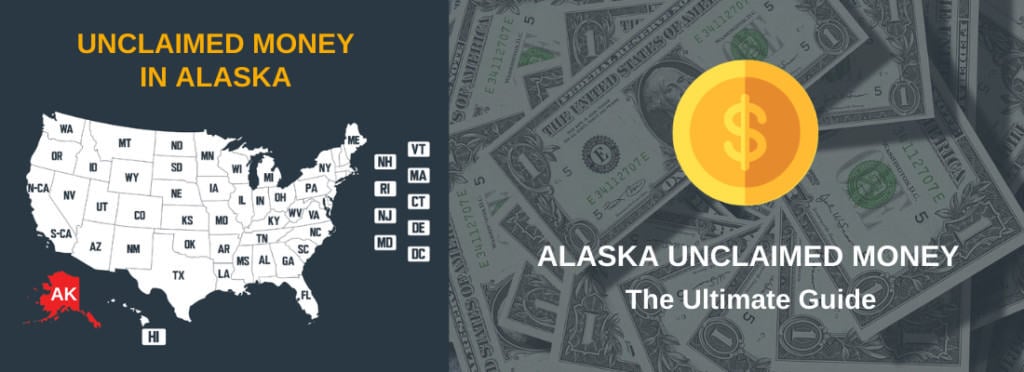
The Unclaimed Property Program of the Alaska Department of Revenue Treasury Division is in charge of the state’s unclaimed property/unclaimed money program. The state of Alaska claims to have millions of dollars in assets waiting to be claimed. The Treasury Department wants to assist real owners in reuniting with their lost money and land.
Missing Money is used by the state of Alaska to help run a searchable database for the missing money program. Alaska, like other states, did not have a statewide unclaimed property policy when it first started. Instead, it was dealt with on a more local basis. Local divisions in Alaska, on the other hand, are somewhat different from those in other states.
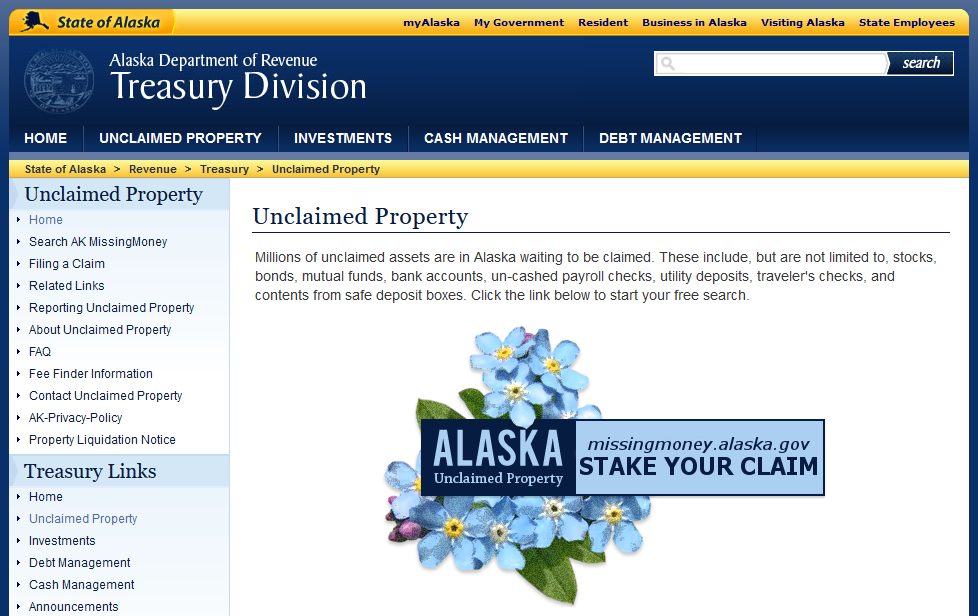
Alaska is divided into boroughs and census areas rather than the usual counties or parishes found in other states. Not all of these areas have identifiable forms of local government; in reality, many do not have any businesses that could be holders, but could be a land owner’s homestead area. Alaska’s nationwide unclaimed property program, however, has details for owners in all parts of the state, including the Aleutians East, Aleutians West, Anchorage, Bethel, Bristol Bay, Denali, Dillingham, Fairbanks North Star, Haines, Juneau, Kenai Peninsula, Kethikan Gateway, Kodiak Island, Lake And Peninsula, Matanuska-Sustina, Nome, North Slope, Northwest Arctic, Prince of Wales-Outer Ketch and other regions within the state.
Unclaimed funds are a source of some misunderstanding. Some people believe that unclaimed money and property are properties that have been left behind by their owners and are now available for the taking. Though unclaimed money and property are considered lost, the legal ownership of the property remains with the owners.
It is called unclaimed money because the person in possession of the funds has been unable to contact the property owner for a specified period of time.
Property is typically abandoned not because the owners want to abandon it, but rather because they have forgotten that they own it. This suggests that the majority of people should look for unclaimed property and see if they have any.
Unclaimed property is intangible personal property that can be quickly turned into cash and kept in a third-party account. Almost any form of property will end up as unclaimed. Stocks, bonds, mutual funds, cash deposits, bank accounts, traveler’s checks, payroll checks, and a car are examples of unclaimed land. The contents of those safe deposits could be auctioned off and converted to cash, which would then be kept for the property owner. Some forms of land, such as real estate and motor vehicles, are excluded from the unclaimed money rules.
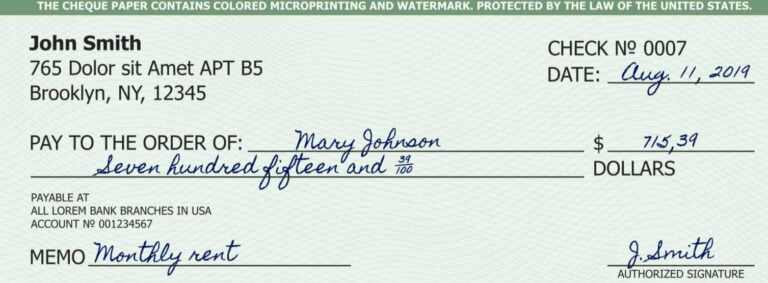
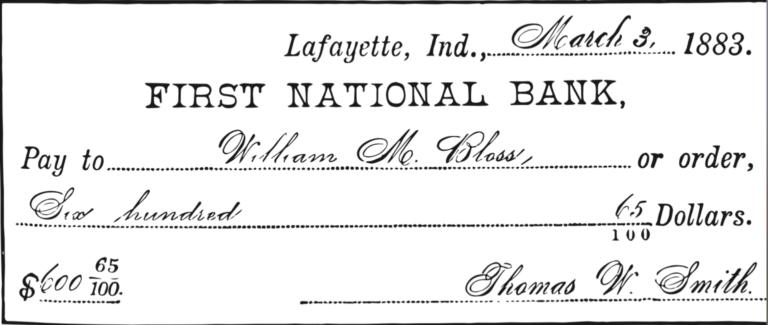
While each state defines unclaimed money differently, the idea of unclaimed or abandoned property is fairly common across states. Unclaimed property in Alaska may be either tangible or intangible personal property that has been left behind.
There does not have to be any desire to abandon the property for it to be abandoned; the property owner merely has to have lost touch with the owners of the property for a set period of time. Bank accounts, salaries, refunds, utility deposits, insurance proceeds, securities, shares, and the contents of safe deposit boxes are all examples of unclaimed land.

Alaska only claims that it has millions of dollars in unclaimed land, but it does not specify how many millions. In the United States, though, there is a considerable amount of unclaimed land. Unclaimed property is estimated to be worth $42 billion, according to the National Association of Unclaimed Property Administrators (NAUPA).
Getting Started With the Missing Money Website in Alaska:
The website Missing Money is well-known to many people. This website combines the opportunity to search for unclaimed property or lost money in the United States. Although it does not cover every state, the Missing Money website is used by 37 states as well as some US territories. Missing Money is a website where you can check for missing money in Alaska and other states.
Unclaimed property searches in Alaska are the same as searches in most of the other states that use the Missing Money website. However, we understand that not everyone has looked up Missing Money. That’s why we’ve put together a step-by-step guide on how to conduct a property search in Alaska.
The tutorial will not only explain each step, but will also include screenshots of each step so you can see how they should be done. If you want to learn how to search for unclaimed property in other jurisdictions, check out our other tutorials, which cover topics such as Missing Money states and states with their own databases.
On Missing Money site, you can search for unclaimed money in Alaska. You can also find information from the following states, territories, and provinces in addition to Alaska: Alabama and Alberta are also in the United States. Florida, Idaho, Illinois, Indiana, Iowa, Kentucky, Louisiana, Maine, Maryland, Massachusetts, Michigan, Minnesota, Mississippi, Missouri, Montana, Nebraska, Nevada, New Hampshire, New Jersey, New Mexico, New York, North Carolina, North Dakota, Ohio, Oklahoma, Puerto Rico, Rhode Island, South Carolina, South Dakota, Tennessee, Vermont, and Utah.
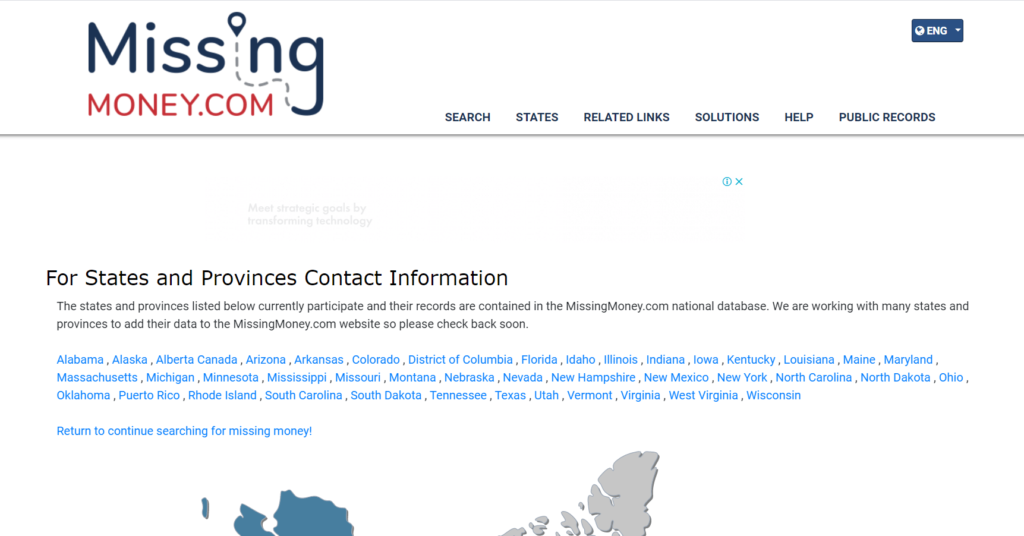
To conduct a search, go to the Missing Money website’s search page, which allows you to simultaneously search any of the above states and territories. The process is so easy and straightforward, and this website is as quick and simple as it can get.
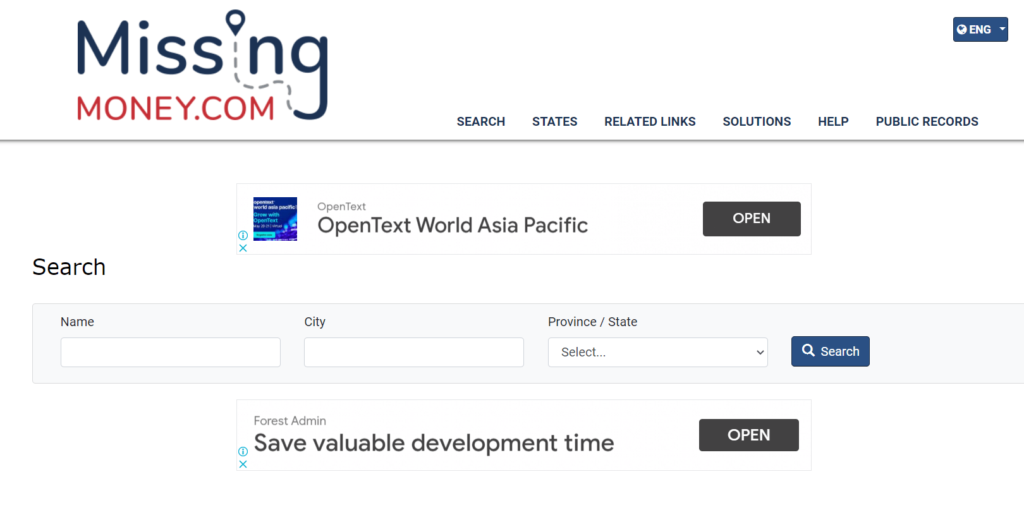
Although the quest helps you to search all the territories at once, you can also restrict the search right away. Name, city, and province or state are the first search parameters you can use. If you’ve looked at some of our other guides, you’ll notice that we use the same searches across the board. For our cases, we’ve used the surname Bob Smith. We chose a common name to ensure that our examples will appear in search results, but there are some pitfalls to avoid when looking for a common name. The greatest danger is that there will be so many results for your quest that going through them all will be impossible. On Missing Money, they only show the first 200 search results, but in Alaska, searching for the name Bob Smith yields over 220 results:
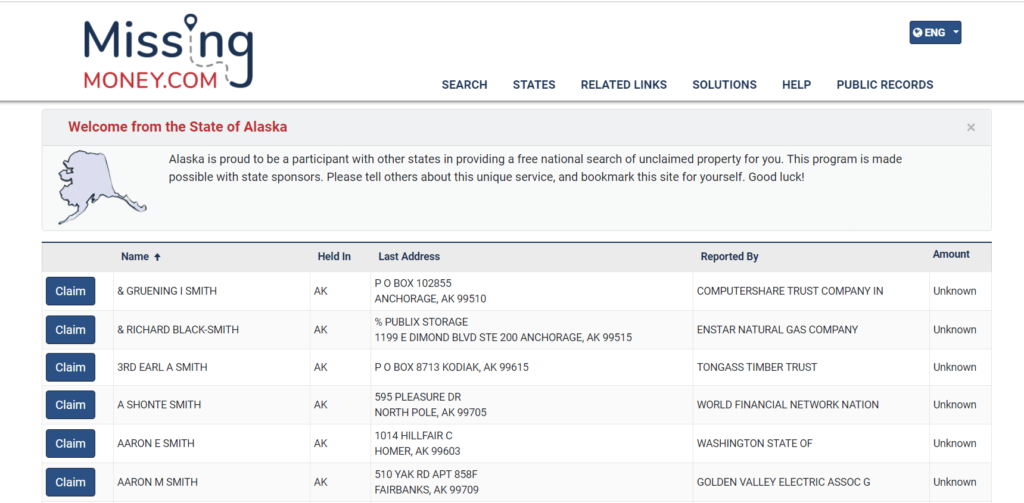
By adding the first name Bob and searching for the name Bob Smith in Alaska, you can narrow it down. Using a full name does not have a significant effect on the amount of search results in some states. Alaska, on the other hand, is a small state with a small population. Using the name Bob Smith narrows the possibilities down to nine:
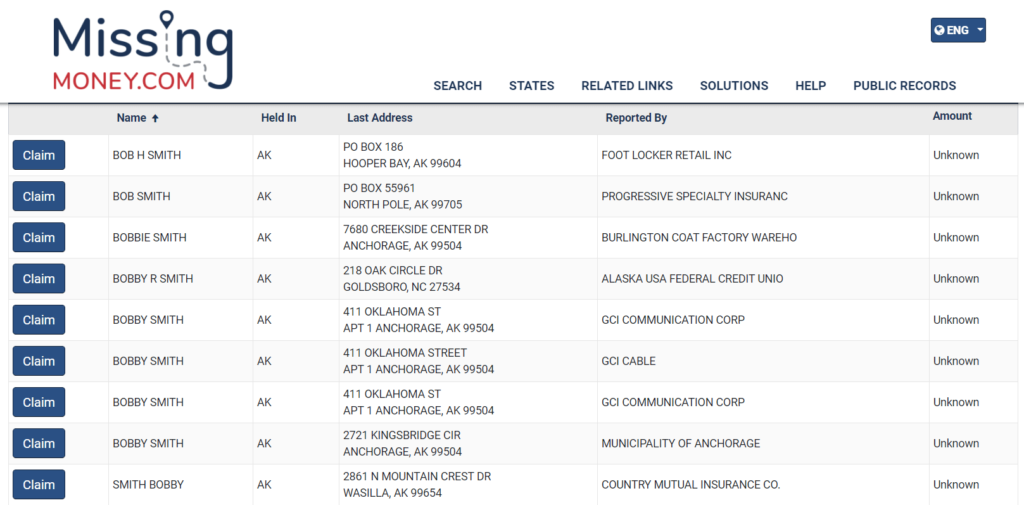
Despite the fact that nine results is a manageable number, we can further narrow it down by searching by city. We will, for example, include the city of Anchorage:
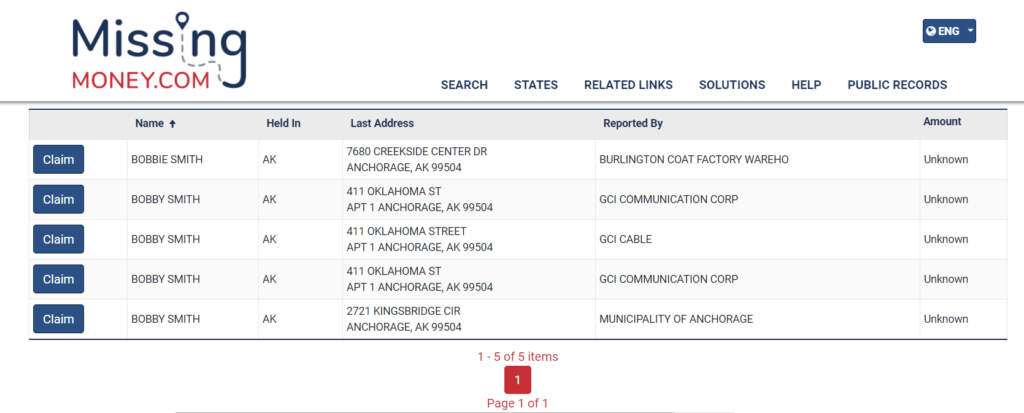
As a consequence, the number of possible outcomes is reduced to just five. However, it is important to examine the outcomes. Bob is a common nickname for Robert, and you’ll note that there are no Roberts among the results.
You must check for any possible name, including full names, maiden names, and nicknames, if you want to get any of the search results. If we look for a Robert Smith in Anchorage, Alaska, we get the following results:
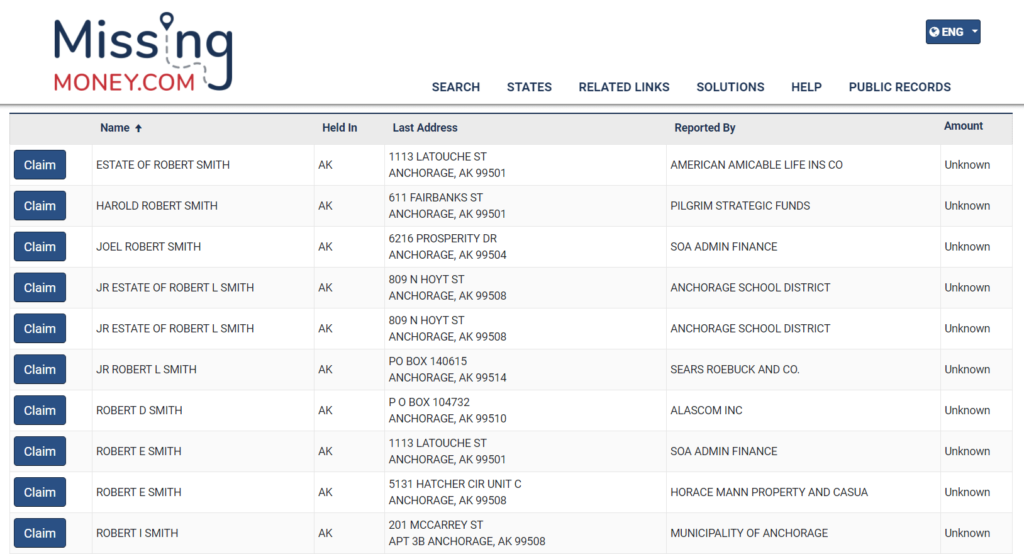
This generates an additional 21 possible outcomes.
Whatever name you search for, the details in your search results would be the same. On the left, there’s a claim button, as well as the property owner’s name, the state where the property is kept, the property owner’s last known address, who reported the property (also known as the holder), and the claim number, if it’s known.
If you want to claim the land, go to the left-hand column and click the claim button. When you click the claim button, the left-hand column will shift to reflect that you are claiming the property:
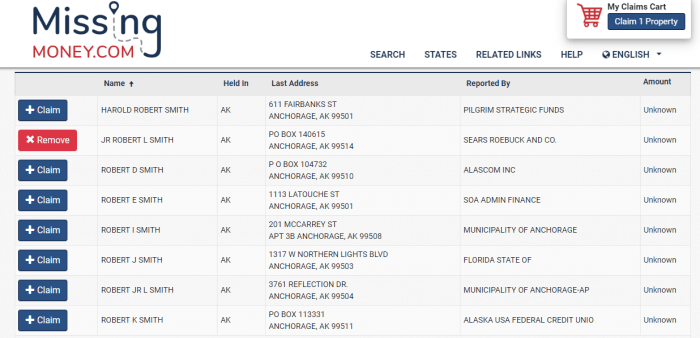
You can delete the property you’ve claimed by clicking the red remove button that appears after you’ve claimed it.
If you’ve chosen all of the assets you want to sue, go to the claims cart on the property’s top right to submit your claim. You simply pressed the claim button. Even if they are listed on the Missing Money website, each state has its own claim process. When you file a property claim in Alaska, you will receive the notice as shown below:
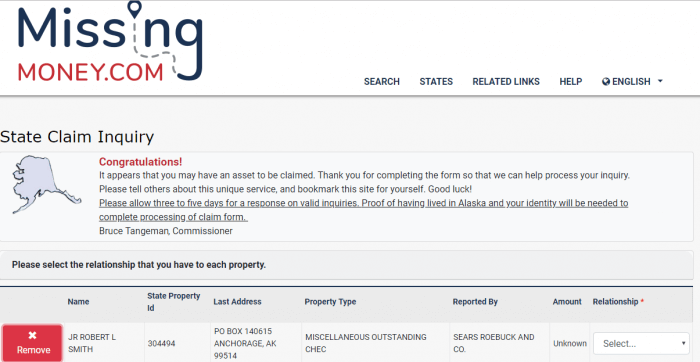
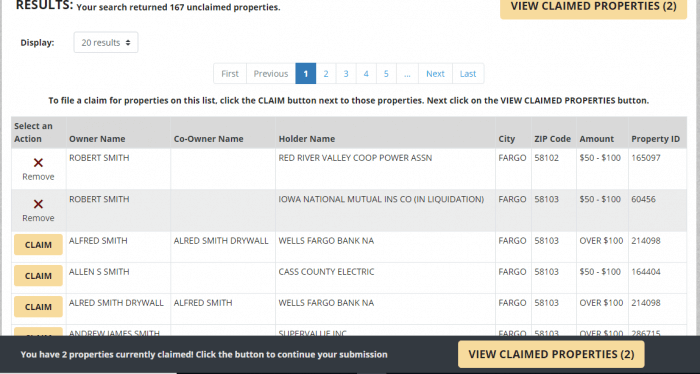
You will be given instructions on how to submit a claim form. The state can take three to five days to respond to an inquiry, according to the document. It also notes that you will be required to provide proof of identity as well as proof of residency in Alaska.
The first step is to choose your connection to the property owner, whether you are the owner, an heir, an executor, a corporate officer, or anything else:
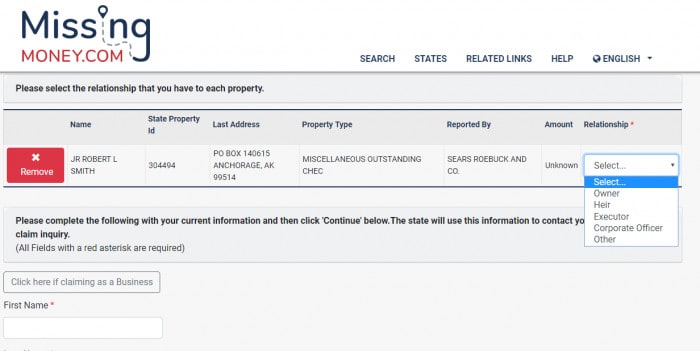
Then you must complete a general information claim form, which includes your first and last names, address, postal code, area, province or state, country, email address, and phone number.
The state checks your claim after you fill out the claim form and informs you within three to five days.
Alaska’s Unclaimed Property Act can be found in the Alaska Statutes 34.45.010. One law states that, “if personal property is consigned to or deposited with a forwarding merchant, wharf, warehouse, or tavern keeper, or the keeper of a depot for the receiving and storage of trunks, luggage, goods, or other personal property, the consignee or bailee must immediately record a description of the property, as well as the date of receipt, in a book held by the bailee or consignee.”
It also continues to state that, “If the property is not left with the consignee or bailee for the purpose of being forwarded, disposed of, or kept according to directions received by the consignee or bailee, at or before the time of the reception of the property, and if the name and residence of the owner of the property is known to the person having possession of the property, the consignee or bailee shall immediately notify the owner, by letter directed to the owner and deposited in the post office, of the reception of the property.”
Find out more information about unclaimed property laws in Alaska here.
An unclaimed property quest for most people would entail more than just browsing through the state’s unclaimed property database. Almost anyone looking for unclaimed property would have to look at other websites. Some of these sites may be state-specific, while others may be broad in scope.
When you’re searching for other places to investigate, think about which states you might look at. Despite the fact that Alaska is on Missing Money and you can search several states at once, you will need to search other states as well. You should include some states on this list where you have lived, made business connections, or where people might have put down roots.
You may also want to look at some non-government websites. There are government sites and private-sector national sites in this category. Which ones you should look into will rely on the types of activities you’ve done in the past; some organizations make sense for some people, but not for others. You may also want to look at some non-government websites. There are government sites and private-sector national sites in this category. Which ones you should look into will rely on the types of activities you’ve done in the past; some organizations make sense for some people, but not for others.
Though everyone is familiar with the IRS, many do not consider it to be a holder or financial institution. The Internal Revenue Service (IRS) collects taxes on behalf of all taxpayers in the United States and keeps additional taxes until the taxpayer receives a refund. If a taxpayer moves, the IRS has a policy of not forwarding income tax refunds and will not forward income tax return checks. You will learn more about the IRS’s policies on their website.
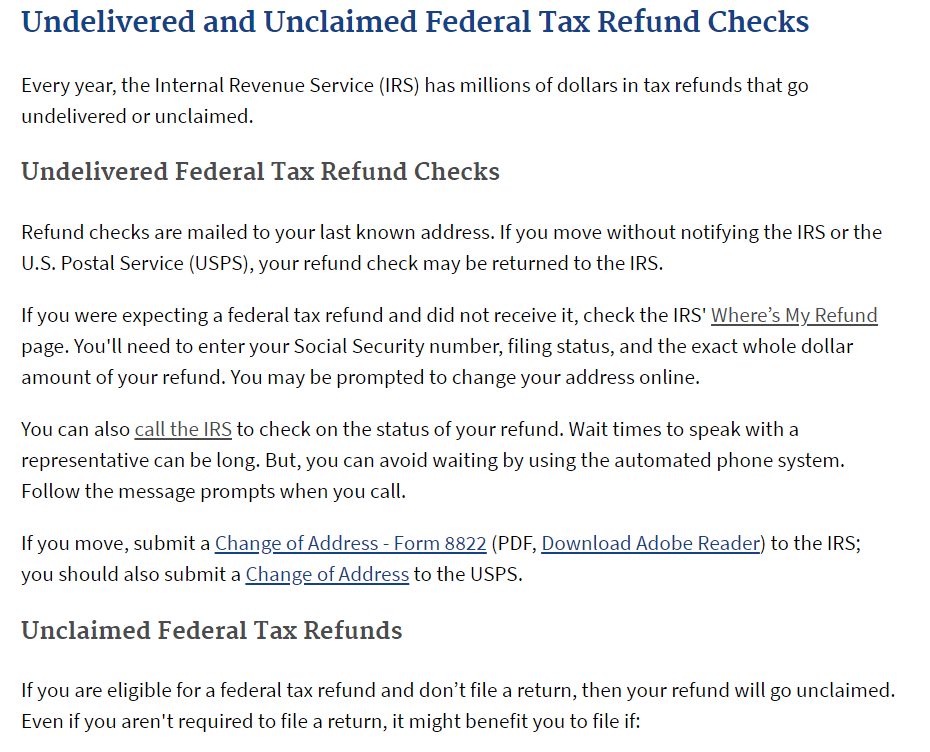
If you are due a tax refund, go to the IRS’s ‘Where’s My Refund’ page to check on the progress of your tax refund. You can also locate any missing tax refund checks from here.
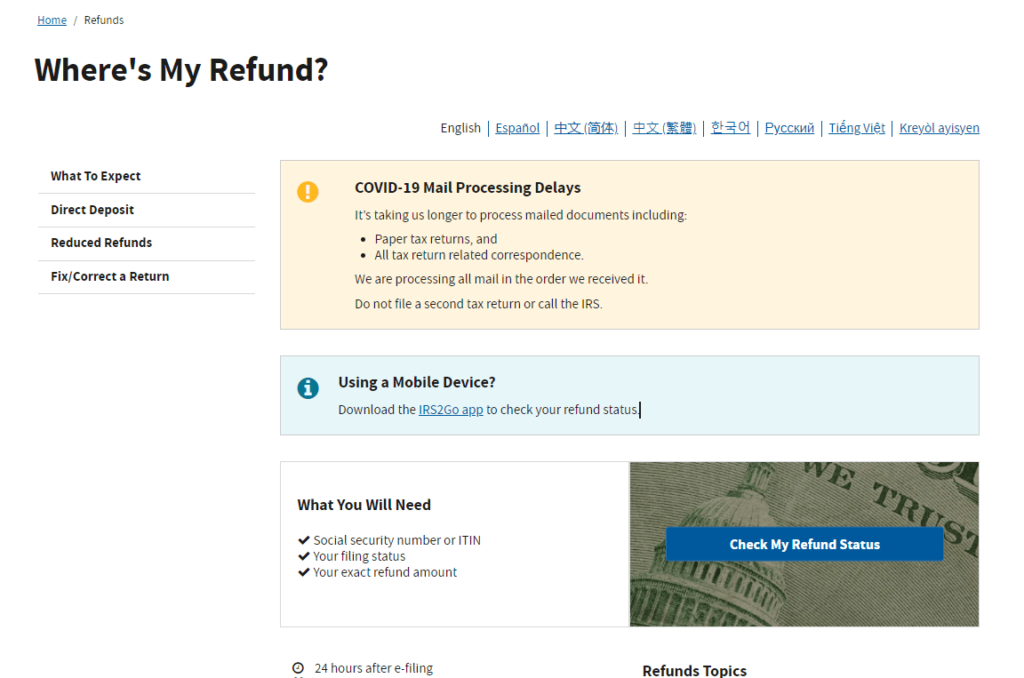
The United States Treasury is another federal-level money holder in the United States. People buy US Savings Bonds and other Treasury products from the Treasury, and the Treasury is the financial entity that holds the money before the bonds are paid. It used to be easy to track down missing money using the Treasury Department’s website.
However, the Treasury no longer maintains a searchable database, making it more difficult for people to track down their lost funds. You will also get information from the US Treasury about how to locate and collect any unclaimed funds. You can reach them by phone at 844-284-2676 or by visiting the Treasury Direct website:
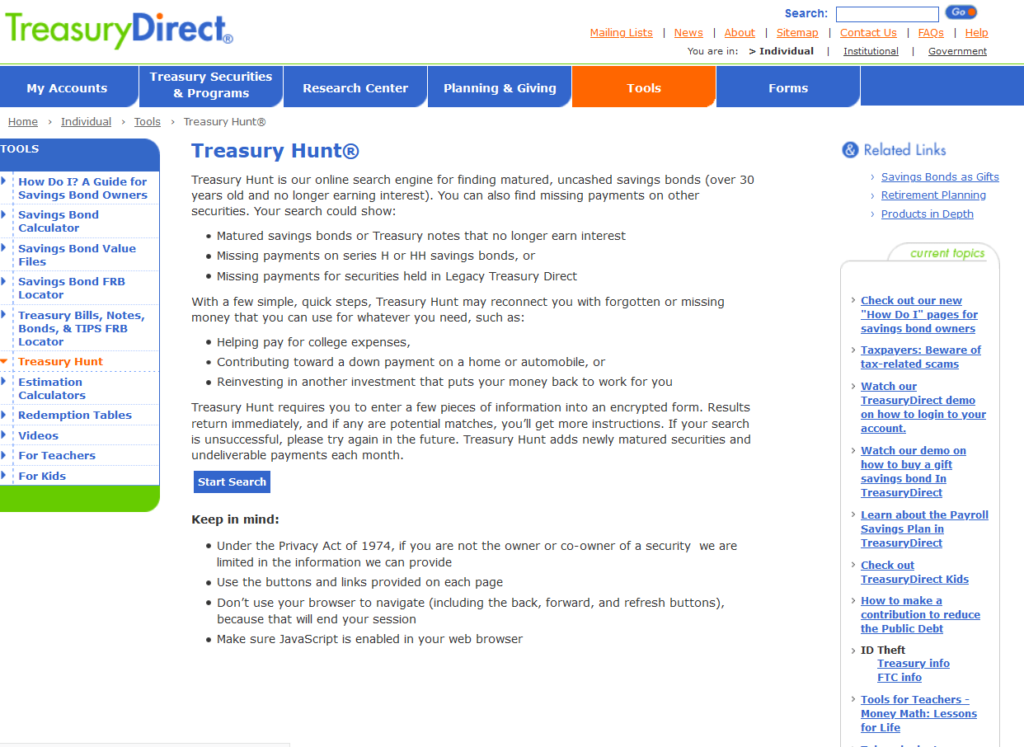
The PBGC is a third federal level site that most people can search if they are searching for unclaimed money. It is not as well-known as the IRS or the US Treasury. The PBGC is a government-run agency at the federal level. Its aim is to ensure that private pension benefits are guaranteed. In addition, the PBGC maintains a searchable database to assist people in locating lost pension benefits:
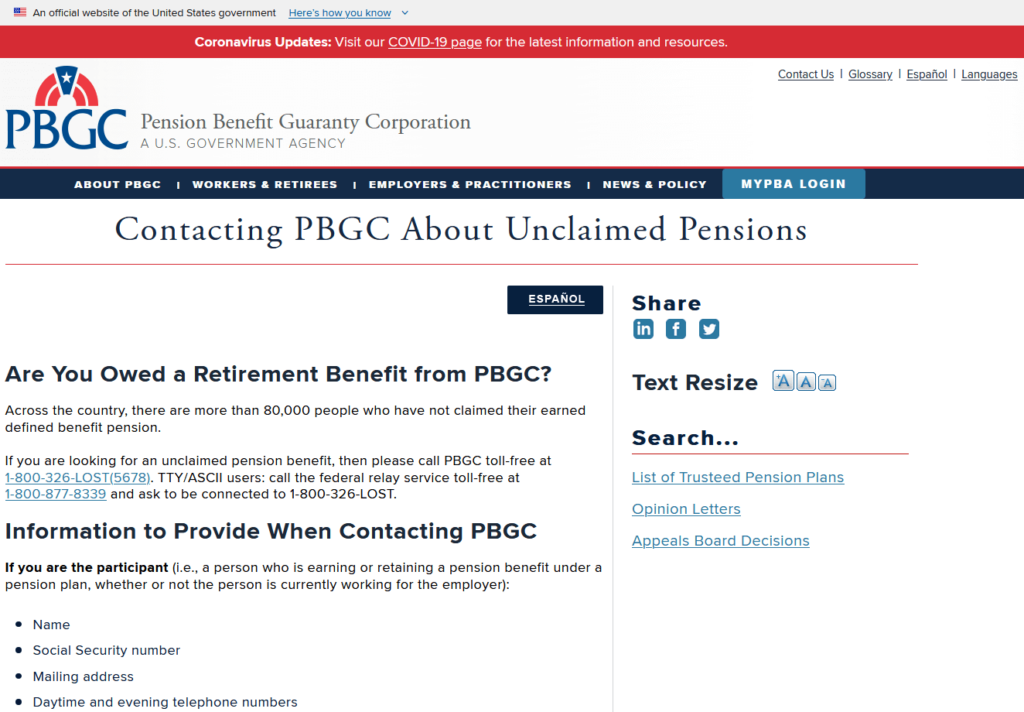
While the final national-level site is not maintained by the federal government, it does function on a national level. The Life Insurance Policy Locator Service of the National Association of Insurance Commissioners is a national agency that is a conglomerate of a variety of life insurance firms in the United States.
Although it does not include every life insurance corporation in the United States, it does include a large number of them, and one of their member firms may be the issuer of a policy of which you are a named beneficiary or the successor to a named beneficiary.
Their website isn’t like the searchable missing property databases in that you can’t search for potential assets, but you can enter your details. The company will then send the details you provide to its member agencies, who will check to see if you are covered by any of their policies:
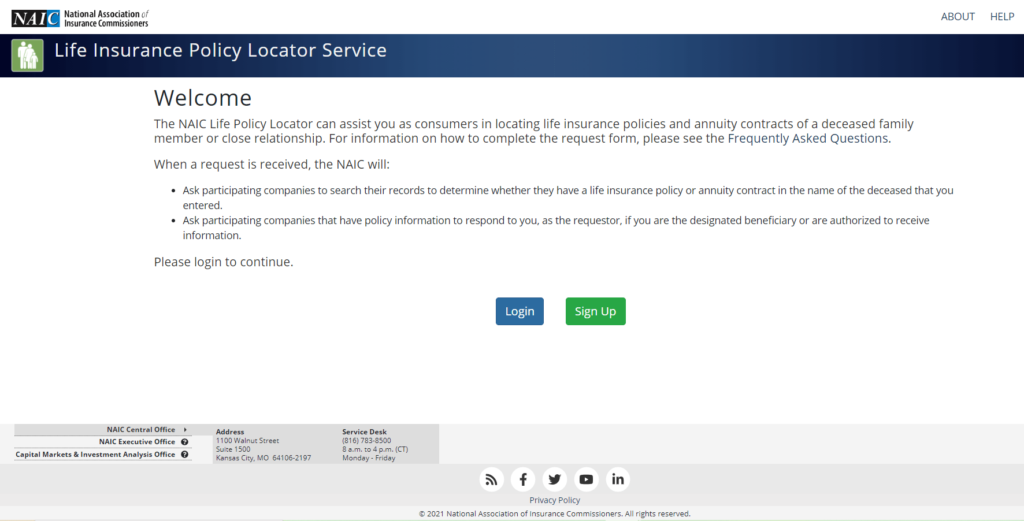
You will need to look at some other sites in addition to the ones mentioned above. This is contingent on the types of interactions you’ve had with various federal agencies. The FDIC, the Department of Housing and Urban Development, the National Credit Union Administration, and the Veteran’s Administration Benefits Department are only a few of these agencies.
In the state of Alaska, the time frame is indefinite. The state keeps the property until it gets claimed by its rightful owner.
Unclaimed property can be both intangible and tangible in Alaska. Real estate and motor vehicles are the only forms of property that are excluded from the unclaimed property law. Checking accounts, savings accounts, securities, dividends, shares, uncashed checks, and land in safe deposit boxes are all examples of unclaimed property.
Despite the fact that some states make substantial attempts to locate owners, Alaska is so large that it doesn’t. You may, however, look up your name on Missing Money to see if the state has any money in its possession.
How does an individual prevent property from being abandoned, lost, or unclaimed? This is one of the most frequently asked questions we get. The most crucial thing to do is maintain communication with the property’s owners. Contacting your financial institutions on a regular basis, telling them if your contact information changes, and reacting to attempts to contact you are all critical steps in preventing your property from being lost. You should maintain accurate account records for all of your financial reports to assist you with this.
You must appoint a trusted individual to have access to your accounts in the event that you die or become incapacitated. A will is insufficient to ensure that your heirs know where to find your properties.
Unclaimed land is seized by the state of Alaska for two purposes. It can make use of the money from unclaimed property while still keeping the property for the owner. More significantly, by assuming ownership of unclaimed property, it will make the process of locating unclaimed property in Alaska much easier.
There are professionals in Alaska who will act as finders for unclaimed money. There are no special qualifications or permits for people who want to work as finders in this state. It does, however, advise people to try to find property on their own before contracting with a finder. Using the Missing Money website to file a claim or claim property is free. In Alaska, there are basic conditions for a fee finder contract.
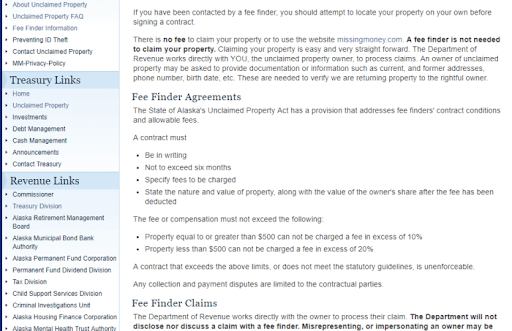
The Matter of property finding in Alaska is no brainer, there is no panning for gold involved at all. In most cases, you will find your money sitting around waiting for you to just claim it. Furthermore, money checks are not time-consuming. So go on, use our ultimate guide above and get your property back!
Disclaimer: OurPublicRecords mission is to give people easy and affordable access to public record information, but OurPublicRecords does not provide private investigator services or consumer reports, and is not a consumer reporting agency per the Fair Credit Reporting Act. You may not use our site or service or the information provided to make decisions about employment, admission, consumer credit, insurance, tenant screening, or any other purpose that would require FCRA compliance.

Copyright © 2024 · OurPublicRecords.org · All Rights Reserved